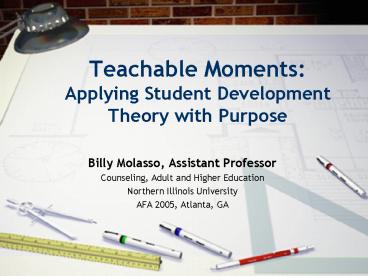Teachable Moments: Applying Student Development Theory with Purpose - PowerPoint PPT Presentation
1 / 18
Title:
Teachable Moments: Applying Student Development Theory with Purpose
Description:
Identify primary challenge of Identity models for fraternity/sorority members. ... with others from a variety of racial, ethnic and cultural backgrounds; ... – PowerPoint PPT presentation
Number of Views:146
Avg rating:3.0/5.0
Title: Teachable Moments: Applying Student Development Theory with Purpose
1
Teachable MomentsApplying Student Development
Theory with Purpose
- Billy Molasso, Assistant Professor
- Counseling, Adult and Higher Education
- Northern Illinois University
- AFA 2005, Atlanta, GA
2
Nov05 JCSD
- Journal of College Student Development
(November-December, 2005 Issue) - Developmental Model of Intercultural Maturity
(King Baxter Magolda, 2005) - Developing a Leadership Identity (Komives, Owen,
Longerbeam, Mainella, Osteen, 2005) - Action-Oriented Democratic Outcomes (Zuniga,
Williams Berger, 2005) - Creating Crossroads for Self-Authorship
(Pizzolato, 2005)
3
Teachable Moments
- What are some incidents you have had with your
students (or heard about) as it relates to issues
of difference? - Think about these incidents as teachable moments!
4
Agenda
- Review Identity Development Models
- Identify primary challenge of Identity models for
fraternity/sorority members. - Explore Intercultural Maturity Model
- Identify specific teachable moments in which we
can take advantage of the Intercultural Maturity
Model
5
Questions
- From your student development theory class in
grad school, what are some of the Identity
Development Models that you studied? - When we think about how our members discover
issues of difference, what is the problem with
most of these models?
6
Difference of Me
Gender
Class
Religion
Dominate Culture
Sexuality
Race
Disability
7
Difference of Others
Gender
Class
Religion
Dominate Culture
Sexuality
Race
Disability
8
Need
- Students with an appreciation for difference
- are better prepared to understand, learn from
and collaborate with others from a variety of
racial, ethnic and cultural backgrounds - demonstrate creative problem solving by
integrating differing perspectives - exhibit the skills required for good teamwork
- demonstrate more effective responsiveness to the
needs of all types of consumers. (p. 6)
Fortune 500 corporations file brief in support of
diversity in higher education (2000, October 16).
On-line press release. http//www.umich.edu/ure
l/admissions/releases/fortune.html
9
Need
- 4 AFA Core Competencies
- Assists community leaders in facilitating the
long standing shared values of fraternities and
sororities in an increasingly pluralistic
society. - Utilizes knowledge of student development theory
and higher education issues when working with
students. - Serves as a resource for organization leaders to
understand the diversification of campus
communities and society and the impact of this on
fraternities and sororities. - Manages and effectively resolves crisis
situations resulting in more informed and
educated students.
10
Comparing Terms
- Difference vs Diversity.
- More inclusive of the range of uniqueness among
our students. - Intercultural vs Multicultural.
- Both domestic and international.
- Implies interaction between cultures.
- Maturity vs Competency.
- Implies application.
11
Intercultural Consciousness
Landreman, L. (2003). A multidemensional model of
intercultural consciousness A reconceptualization
of multicultural competence. Paper presented at
the Annual Meeting of ASHE, Portland, OR.
12
Intercultural Maturity
King, P.M. Baxter Magolda, M.B. (2005) A
developmental model of intercultural maturity.
Journal of College Student Development, 46,
571-592.
13
Cognitive
- Initial. Assumes knowledge is certain and
categorizes knowledge as right and wrong is
naïve above different cultural practices and
values resists challenges to ones own beliefs
and views differing cultural perspectives as
wrong. - Intermediate. Evolving awareness and acceptance
of uncertainty and multiple perspectives ability
to shift from accepting authoritys knowledge
claims to personal processes for adopting
knowledge claims. - Mature. Ability to consciously shift perspectives
and behaviors into an alternative cultural
worldview and to use multiple cultural frames.
King, P.M. Baxter Magolda, M.B. (2005) A
developmental model of intercultural maturity.
Journal of College Student Development, 46,
571-592.
14
Intrapersonal
- Initial. Lack of awareness of ones own values
and intersection of social identity lack of
understanding of other cultures. - Intermediate. Evolving sense of identity as
distinct from external others perceptions
tension between external and internal definitions
prompts self-exploration. - Mature. Capacity to create an internal self that
openly engages challenges to ones views and
beliefs and that considers social identities in a
global national context integrates aspects of
self into ones identity.
King, P.M. Baxter Magolda, M.B. (2005) A
developmental model of intercultural maturity.
Journal of College Student Development, 46,
571-592.
15
Interpersonal
- Initial. Dependent relations with similar others
is a primary source of identity and social
affirmation perspectives of different others are
viewed as wrong awareness of how social systems
affect group norms and intergroup differences is
lacking. - Intermediate. Willingness to interact with
diverse others and refrain from judgment relies
of independent relations in which multiple
perspectives exist. - Mature. Capacity to engage in meaningful,
independent relationships with diverse others
that are grounded in an understanding and
appreciation for human differences understanding
of ways individual and community practices affect
social systems willing to work for the rights of
others.
King, P.M. Baxter Magolda, M.B. (2005) A
developmental model of intercultural maturity.
Journal of College Student Development, 46,
571-592.
16
Small Groups
- In small groups, identify specific strategies
that you can do as a fraternity/sorority advisor
to assist students progress through the levels of
development for - Cognitive Domain
- Intrapersonal Domain
- Interpersonal Domain
17
Teachable Moments
- Who are we?
- Where are we?
- Where do we want to be?
- What will we do as individuals and with others to
make a difference?
Adapted from One America Dialogue Guide
Conducting an Effective Community Dialogue on Race
18
Is this model useful to you as a
fraternity/sorority advisor?
Questions or Comments?






























